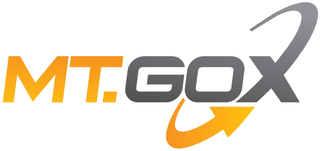A cryptocurrency exchange, or a digital currency exchange (DCE), is a business that allows customers to trade cryptocurrencies or digital currencies for other assets, such as conventional fiat money or other digital currencies. Exchanges may accept credit card payments, wire transfers or other forms of payment in exchange for digital currencies or cryptocurrencies. A cryptocurrency exchange can be a market maker that typically takes the bid–ask spreads as a transaction commission for its service or, as a matching platform, simply charges fees.

A cryptocurrency, crypto-currency, or crypto is a digital currency designed to work as a medium of exchange through a computer network that is not reliant on any central authority, such as a government or bank, to uphold or maintain it. It is a decentralized system for verifying that the parties to a transaction have the money they claim to have, eliminating the need for traditional intermediaries, such as banks, when funds are being transferred between two entities.

Mt. Gox was a bitcoin exchange based in Shibuya, Tokyo, Japan. Launched in 2010, it was handling over 70% of all bitcoin (BTC) buys/sells worldwide by early 2014, when it abruptly ceased operations amid revelations of its involvement in the loss/theft of hundreds of thousands of bitcoins, then worth hundreds of millions in US dollars.
Coinbase Global, Inc., branded Coinbase, is an American publicly traded company that operates a cryptocurrency exchange platform. Coinbase is a distributed company; all employees operate via remote work. It is the largest cryptocurrency exchange in the United States in terms of trading volume. The company was founded in 2012 by Brian Armstrong and Fred Ehrsam. In May 2020, Coinbase announced it would shut its San Francisco, California, headquarters and change operations to remote-first, part of a wave of several major tech companies closing headquarters in San Francisco in the wake of the COVID-19 pandemic.

Bitcoin is a cryptocurrency, a digital asset that uses cryptography to control its creation and management rather than relying on central authorities. Originally designed as a medium of exchange, Bitcoin is now primarily regarded as a store of value. The history of bitcoin started with its invention and implementation by Satoshi Nakamoto, who integrated many existing ideas from the cryptography community. Over the course of bitcoin's history, it has undergone rapid growth to become a significant store of value both on- and offline. From the mid-2010s, some businesses began accepting bitcoin in addition to traditional currencies.
Blockchain.com is a cryptocurrency financial services company. The company began as the first Bitcoin blockchain explorer in 2011 and later created a cryptocurrency wallet that accounted for 28% of bitcoin transactions between 2012 and 2020. It also operates a cryptocurrency exchange and provides institutional markets lending business and data, charts, and analytics.
Circle began as a peer-to-peer payments technology company that now manages stablecoin USDC, a cryptocurrency the value of which is pegged to the U.S. dollar. It was founded by Jeremy Allaire and Sean Neville in October 2013. Circle is headquartered in Boston, Massachusetts. USDC, the second largest stablecoin worldwide, is designed to hold at or near a stable price of $1. The majority of its stablecoin collateral is held in short-term U.S. government securities.
HTX is a Seychelles-based cryptocurrency exchange. Founded in China as Huobi, the company now has offices in Hong Kong, South Korea, Japan and the United States. In August 2018 it became a publicly listed Hong Kong company.
BitGo, Inc. is a digital asset trust company and security company, headquartered in Palo Alto, California. It was founded in 2013 by Mike Belshe and Ben Davenport. Galaxy Digital announced its acquisition of BitGo in 2021 for $1.2 billion, although this acquisition was announced to have been canceled in 2022 after the crypto downturn, with BitGo continuing as an independent company.
Kraken is a United States–based cryptocurrency exchange, founded in 2011. It was one of the first bitcoin exchanges to be listed on Bloomberg Terminal and was valued at US$10.8 billion in mid-2022. The company has been the subject of several regulatory investigations since 2018, and has agreed to cumulative fines of over $30 million.
Revolut is a global neobank and financial technology company that offers banking services. Headquartered in London, it was founded in 2015 by Nikolay Storonsky and Vlad Yatsenko. It offers accounts featuring currency exchange, debit cards, virtual cards, Apple Pay, interest-bearing "vaults", stock trading, crypto, commodities, and other services.
Lazarus Group is a cybercrime group made up of an unknown number of individuals run by the government of North Korea. While not much is known about the Lazarus Group, researchers have attributed many cyberattacks to them between 2010 and 2021. Originally a criminal group, the group has now been designated as an advanced persistent threat due to intended nature, threat, and wide array of methods used when conducting an operation. Names given by cybersecurity organizations include Hidden Cobra and ZINC or Diamond Sleet. According to North Korean defector Kim Kuk-song, the unit is internally known in North Korea as 414 Liaison Office.
Coincheck is a Japanese bitcoin wallet and exchange service headquartered in Tokyo, Japan, founded by Koichiro Wada and Yusuke Otsuka. It operates exchanges between bitcoin, ether and fiat currencies in Japan, and bitcoin transactions and storage in some countries.
Bitfinex is a cryptocurrency exchange owned and operated by iFinex Inc, and is registered in the British Virgin Islands. Bitfinex was founded in 2012. It was originally a peer-to-peer Bitcoin exchange, and later added support for other cryptocurrencies.
Binance Holdings Ltd., branded Binance, is a global company that operates the largest cryptocurrency exchange in terms of daily trading volume of cryptocurrencies. Binance was founded in 2017 by Changpeng Zhao, a developer who had previously created high-frequency trading software. Binance was initially based in China, then moved to Japan shortly before the Chinese government restricted cryptocurrency companies. Binance subsequently left Japan for Malta and currently has no official company headquarters.
Cryptocurrency and crime describe notable examples of cybercrime related to theft of cryptocurrencies and some methods or security vulnerabilities commonly exploited. Cryptojacking is a form of cybercrime specific to cryptocurrencies that have been used on websites to hijack a victim's resources and use them for hashing and mining cryptocurrency.
Bithumb is a South Korean cryptocurrency exchange. Founded in 2014, Bithumb Korea has 8 million registered users, 1 million mobile app users, and a current cumulative transaction volume has exceeded USD $1 trillion.
bitFlyer is a private company headquartered in Tokyo, Japan and founded in 2014. It operates one of the largest cryptocurrency exchanges with 2.5 million users and develops other crypto-related technology.
The Bitfinex cryptocurrency exchange was hacked in August 2016. 119,756 bitcoin, worth about US$72 million at the time, were stolen.
Chainalysis is an American blockchain analysis firm headquartered in New York City. The company was co-founded by Michael Gronager, Jan Moller and Jonathan Levin in 2014, and is the first start-up company dedicated to the business of Bitcoin tracing. It offers compliance and investigation software to analyze the blockchain public ledger, which is primarily used to track virtual currencies. Next to banks and brokers its customers have included the United States Federal Bureau of Investigation, Drug Enforcement Administration, and the Internal Revenue Service Criminal Investigation, as well as the United Kingdom's National Crime Agency.


